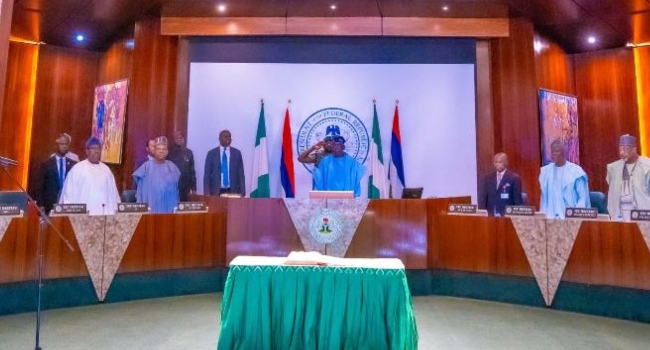As the planned ‘EndBadGovernance’ protest approaches in August, President Bola Tinubu held an emergency closed-door meeting on Thursday with top traditional rulers, security officials, and governors from his party, the ruling All Progressives Congress (APC).
The high-level meeting took place at the State House in Abuja, the nation’s capital. The APC governors were led by the Chairman of the Progressives Governors’ Forum and Imo State Governor, Hope Uzodinma.
Several first-class traditional rulers were present, including the Ooni of Ife, Oba Enitan Ogunwusi, and the Sultan of Sokoto, Muhammadu Saad Abubakar III, along with other traditional leaders from across the country.
The meeting was also attended by National Security Adviser Nuhu Ribadu, Inspector General of Police Kayode Egbetokun, ministers, and other members of the President’s cabinet. Later, a delegation of Islamic scholars (Ulamas) joined the discussion.
President Tinubu, who was sworn in as President in May 2023, has urged dissatisfied youths to call off the planned ‘EndBadGovernance’ protest next month.
In a move to address citizens’ grievances, he sent a bill to the National Assembly to raise the minimum wage from N30,000 to N70,000. Both legislative chambers quickly passed the bill on Tuesday, and it is now awaiting the President’s assent.
On Thursday, military authorities issued a warning that certain unscrupulous elements are planning to hijack the upcoming protest and incite anarchy, similar to the recent events in Kenya.
The police also cautioned against potential violent demonstrations next month. Governor Uzodinma noted that the protest could be hijacked and turn violent, reminiscent of the EndSARS protests against police brutality in October 2020.
The protest, which is scheduled to take place in August, is against economic hardship and has been gaining traction on social media. It is planned to occur across all states of the Federation and the Federal Capital Territory (FCT), Abuja. The organizers of the protest remain anonymous.
In recent months, the prices of food and basic commodities have skyrocketed, as Nigerians face one of the worst inflation and economic crises in the country’s history, driven by the government’s removal of petrol subsidies and the unification of forex windows.



